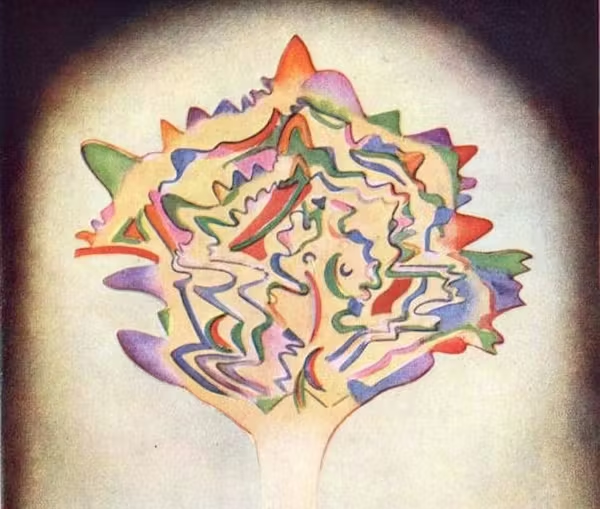
occult

Victorian Occultism and the Art of Synesthesia
Grounded in the theory that ideas, emotions, and even events, can manifest as visible auras, Annie Besant and Charles Leadbeater’s Thought-Forms (1901) is an odd and intriguing work. Benjamin Breen explores these “synesthetic” abstractions and asks to what extent they, and the Victorian mysticism of which they were born, influenced the Modernist movement that flourished in the following decades. more

Ghostwriter and Ghost: The Strange Case of Pearl Curran & Patience Worth
In early 20th-century St. Louis, Pearl Curran claimed to have conjured a long-dead New England puritan named Patience Worth through a Ouija board. Although mostly unknown today, the resulting books, poems, and plays that Worth "dictated" to Curran earned great praise at the time. Ed Simon investigates the curious and nearly forgotten literary fruits of a “ghost” and her ghostwriter. more

The Strange Case of Mr William T. Horton
Championed in his day by friend and fellow mystic W. B. Yeats, today the artist William T. Horton and his stark minimalistic creations are largely forgotten. Jon Crabb on a unique and unusual talent. more

Francis van Helmont and the Alphabet of Nature
Largely forgotten today in the shadow of his more famous father, the 17th-century Flemish alchemist Francis van Helmont influenced and was friends with the likes of Locke, Boyle, and Leibniz. While imprisoned by the Inquisition, in between torture sessions, he wrote his Alphabet of Nature on the idea of a universal “natural” language. Je Wilson explores. more

Jon Crabb on the witch craze of early modern Europe, and how the concurrent rise of the mass-produced woodcut helped forge the archetype of the broom-riding crone — complete with cauldron and cats — so familiar today. more

Although Jacques Collin de Plancy’s Dictionnaire infernal, a monumental compendium of all things diabolical, was first published in 1818 to much success, it is the fabulously illustrated final edition of 1863 which secured the book as a landmark in the study and representation of demons. Ed Simon explores the work and how at its heart lies an unlikely but pertinent synthesis of the Enlightenment and the occult. more

Eric, Count Stenbock: A Catch Of A Ghost
With his extravagant dress, entourage of exotic pets, and morbid fascinations, Count Stenbock is considered one of the greatest exemplars of the Decadent movement. David Tibet on the enigmatic writer’s short and curious life. more

Divining the Witch of York: Propaganda and Prophecy
Said to be spawn of the devil himself and possessed with great powers of prophetic insight, Mother Shipton was Yorkshire’s answer to Nostradamus. Ed Simon looks into how, regardless of whether this prophetess witch actually existed or not, the legend of Mother Shipton has wielded great power for centuries — from the turmoil of Tudor courts, through the frictions of civil war, to the spectre of Victorian apocalypse. more

The Emancipatory Visions of a Sex Magician: Paschal Beverly Randolph’s Occult Politics
Erotic magic, Black emancipation, gender fluidity, interplanetary spirit realms — these were but a few of the topics that preoccupied Paschal Beverly Randolph (b. 1825), an occult thinker who believed that his multiracial identity afforded him “peculiar mental power and marvelous versatility”. Lara Langer Cohen considers the neglected politics of Randolph’s esoteric writings alongside the repeated frustration of his activism: how dreams of other worlds, above and below our own, reflect the unfulfilled promises of Emancipation. more

Marked by Stars: Agrippa’s Occult Philosophy
Reading Heinrich Cornelius Agrippa’s encyclopedic study of magic is like stumbling into a vast cabinet of curiosities, where toad bones boil water, witches transmit misery through optical darts, and numbers, arranged correctly, can harness the planets’ powers. Anthony Grafton explores the Renaissance polymath’s occult insights into the structure of the universe, discovering a path that leads both upward and downward: up toward complete knowledge of God, and down into every order of being on earth. more























